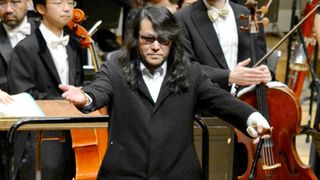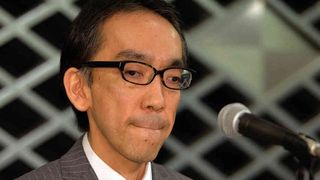Resident Evil composer and "Japanese Beethoven" is a big fat phony
Musical prodigies are some of the most talented and inspirational people. They create masterpieces that can touch the soul and live on as timeless classics. But not everyone is that lucky. What about those of us who don't have any unbelievable, god-given talents to amaze the world with? Why are the rest of us bound to a life of mediocrity and non-glory? Well, it doesn't have to be that way. You can always follow the example of the legendary video game composer, Mamoru Samuragochi: Lie and put your name on some other genius's work.

So, this story has been an ongoing news epic over the last week. First, Samuragochi, came out saying (through his lawyer) that he used a ghost-writer over the last decade to create his compositions--which included work in the Resident Evil and Onimusha franchises. Other pieces include a heart-felt dedication to those lost to the Hiroshima bomb in 1945, earning him a prestigious "citizen's award" for his contribution. And then there’s the composition called, "Sonatina for Violin," which is said to be featured during the Winter Olympics this year in Sochi. Before Samuragochi had his "guilt trip," he had been the composer credited for these masterpieces. He was known as a talented, deaf musical genius. Yeah, that's right; a deaf musical genius. A "modern Beethoven," they called him.
At this point in the story, it all kind of makes sense and Samuragochi doesn't look that bad. He's deaf, and that seems like a reason one might seek out another composer to come in and offer some help. At least, it makes a little bit of sense, right? I mean, you could still give him the benefit of the doubt (maybe). He's bad, but not that bad. Needless to say, apologies were made, his CDs were taken off of store shelves, and concerts cancellations were considered. It was a sad end to what we thought was an outstanding career. But, the story doesn't quite end there.

Enter Takashi Niigaki. He's the guy that actually wrote all of these wonderful works of art. He is the ghost-writer Samuragochi was talking about. But it seems that the once-revered, fake composer wasn't telling the whole story, and now Niigaki is ready to spill the juicy details. Turns out, Samuragochi might not be deaf after all. In a public confession, Niigaki told sources that he didn't think that Samuragochi was actually deaf, saying it was "an act that he was performing to the outside world." How did Niigaki come to that conclusion? The fraud actually listened to his compositions and gave Niigaki feedback. Something that a person with a hearing impairment might have difficulty doing. But it doesn't end there. Samuragochi reportedly threatened to commit suicide if Niigaki would refuse to write his music. What?
To sum it all up: Samuragochi lied about creating 10 years of beloved music, pretended he was deaf, and held the real composer hostage by threatening to kill himself. All of this ended in Samuragochi's publisher putting a complete halt on shipping his albums, concerts have been canceled, and his citizen's award might be taken away. What is the lesson here? Don't lie about your professional skills, exploit a dude with legit musical talent, and be an outright crazy person.
And now I leave you with this quote Samuragochi told Time Magazine, "If you trust your inner sense of sound, you create something that is truer. It is like communicating from the heart. Losing my hearing was a gift from God."
Sign up to the 12DOVE Newsletter
Weekly digests, tales from the communities you love, and more
Many years ago, Lorenzo Veloria was a Senior Editor here at 12DOVE helping to shape content strategy. Since then, Lorenzo has shifted his attention to Future Plc's broader video game portfolio, working as a Senior Brand Marketing Manager to oversee the development of advertising pitches and marketing strategies for the department. He might not have all that much time to write about games anymore, but he's still focused on making sure the latest and greatest end up in front of your eyes one way or another.













